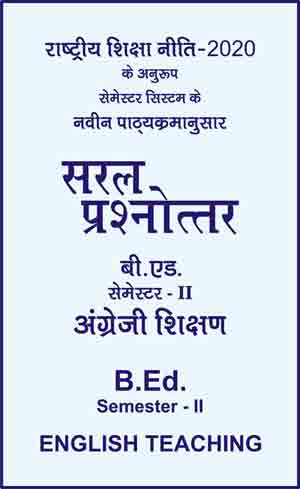|
बी एड - एम एड >> बीएड सेमेस्टर-2 अंग्रेजी शिक्षण बीएड सेमेस्टर-2 अंग्रेजी शिक्षणसरल प्रश्नोत्तर समूह
|
5 पाठक हैं |
||||||
बीएड सेमेस्टर-2 अंग्रेजी शिक्षण - सरल प्रश्नोत्तर
Question- Classify the Cognitive Objectives.
Ans.
Classify of Cognitive Objectives — The cognitive objectives may be classified into following six classes or stages :—
(i) Knowledge,
(ii) Comprehension,
(iii) Application,
(iv) Analysis
(v) Synthesis
(vi) Evaluation.
Now we shall discuss about these stages in detail.
(i) Knowledge Objective – The cognitive objectives are concerned with the development of recall and recognition activities of the students with the help of teams, facts, informations and theories. This objective also creates essential conditions for recalling and recognizing the conventions, laws, therories, criteria and categories by the students.
Bloom suggested that knowledge under cognitive domain is of three types i.e. knowledge of specifics, knowledge of ways and means of dealing with specifics and knowledge of universals and abstractions.
Knowledge of Specifics – It means recalling of specific terminology, facts and informations. The knowledge of specifics is also divided into two sub categories namely knowledge of terminology and knowledge of specific facts. The knowledge of terminology is the knowledge of verbal and non-verbal references. These have normal signs and these include definite specific terms, description of their qualities, relationships and their parts so that the general meaning of the various terms may be acquired. The specific facts means the knowledge of events, dates, places and persons. It is concerned with the general knowledge of specific facts and their recalling.
Knowledge of ways and means – In this category appropriate decisions are taken and the criticism is carried out by studying systematically the various ways and means of the knowledge. Bloom has further divided the ways and means dealing with specifics into the following five categories :—
— knowledge of conventions.
— knowledge of trends and sequences.
— knowledge of criteria.
— knowledge of methodology.
— knowledge of classification and categories.
Knowledge of Universals and Abstractions – The knowledge of universals and abstractions is concerned with the laws and principles. Bloom has given the following two forms of knowledge of universals.
— knowledge of principles and generalization.
— knowledge of theories and structures.
(ii) Comprehension Objective – It means understanding of new knowledge. In other words, comprehension includes knowledge. The students who have comprehension of the contents, i.e., the recalling and recognition abilities regarding certain contents have been developed, they can carry on the activities of translation, interpretation and extrapolation on the basis of comprehension objective. It has three levels :–
— translation.
— interpretation.
— extrapolation.
(iii) Application Objective – Application is followed after knowledge and comprehension. It has also three levels which are indicated below :–
— generalisation of laws and principles.
— diagnosis of weakness.
— use of contents or terms and laws by the students in their own statements.
(iv) Analysis Objective – After knowledge, comprehension and application, analysis is followed. In other words, analysis is possible only when knowledge, comprehension and application objectives have been acquired. It includes divisions of the content into its elements and these are mutually related. The analysis objective has also three levels.
— analysis of elements.
— analysis of relationships.
— analysis of organized principles.
(v) Synthesis Objective – It is also termed as creative objective because in this step the elements are assembled to give a complete picture and a new format is prepared. This develops the creative abilities of the students. It also has further three levels :–
— production of unique communication.
— production of a plan or proposed set of operations after synthesizing the elements.
— derivation of a set of abstract relations.
(vi) Evaluation Objective – Evaluation is the highest level of the cognitive domain. It is a continuous process. In this domain after making critical decisions regarding the laws of contents, principles and facts, it is explored by tests or other types of norms that.......
— whether the determined teaching objectives have been achieved or not?
— whether the learning experiences created in the class-room proved effective or not?
— how fairly the teaching objectives have been achieved?
|
|||||













